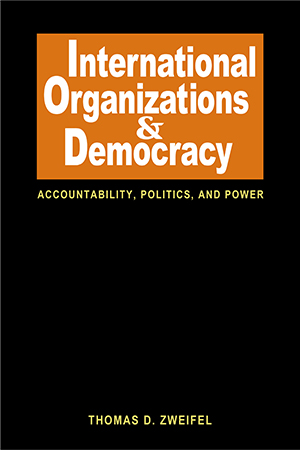Thomas D. Zweifel
Do international organizations represent the interests of the global citizenry? Or are they merely vehicles for the agendas of powerful nations and special interests? Thomas Zweifel explores this increasingly contentious issue, deftly blending history, theory, and case studies.
Zweifel's analysis covers both regional organizations (e.g., the EU, NAFTA, NATO, the AU) and such global institutions as the United Nations, the World Bank, and the World Trade Organization. With international organizations becoming perhaps the most appropriate-if not the only-forum for tackling myriad transnational challenges, his systematic study of how these organizations function is central to the study of both international relations and democracy in the 21st century.
Thomas D. Zweifel, CEO of Swiss Consulting Group, is also adjunct professor at Columbia University's School of International and Public Affairs. His recent publications include Democratic Deficit? and Culture Clash.
"Students will undoubtedly find it provocative, and will also appreciate the useful primers on the organizations it assesses."—Steven Bernstein, Political Science Quarterly
"Reflecting the theoretical eye of a trained social scientist—and a dose of common sense—this path-breaking book offers the first empirical analysis of democratic processes across major international organizations. It is a must read for scholars, practitioners, and students of world politics."—Andrew Moravcsik, Princeton University
"A valuable contribution to a little-known area, written in a clear and compelling way.... Zweifel's accessible book sets the stage for an informed debate on the place of 'We, The People' in global governance."—Shepard L. Forman, Center on International Cooperation, New York University
"Thomas Zweifel's new book should be required reading for students of international law and politics.... As international organizations become increasingly more important in the global arena—in some cases displacing governments as the predominant actors—teachers, students, and practitioners alike will turn to this distinctive and original text for guidance."—Michael F. Osborne, international jurist; member of the Cape Town Bar and New York Bar
"Ambitious and thought-provoking.... "—Edward Luck, Columbia University
"Everyone concerned with how international organizations could be made more democratic, and what that means, will be interested in Zweifel's ambitious and idealistic attempt to rate international organizations according to an innovative scale of procedural democracy."—Robert O. Keohane, Princeton University








